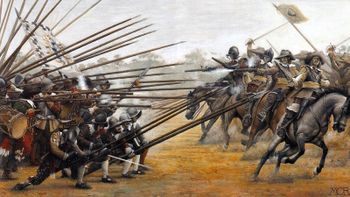Delsolan Civil War
| This page is a work in progress by its author(s) and should not be considered final. |
| Delsolan Civil War | |||||||
|---|---|---|---|---|---|---|---|
 Consular pikemen repel an attack from Odakard cavalry at the First Battle of Tyrusan |
|||||||
|
|||||||
| Belligerents | |||||||
| Consulars | Odakards | ||||||
| Commanders and leaders | |||||||
| Josef Ibarún Lord of Olsali Lord of Gerhaal | Rankon Odak Lord of Hadra Dragutin Ukoda |
||||||
| Casualties and losses | |||||||
| 53,000 troops | 31,000 troops | ||||||
The Delsolan Civil War (1597-1610) was a series of armed conflicts between the Odakards and Consulars within The Republic of Delsola over, principally the manner of its government. The war pitted the Odakards, supporters of the High-Elect at the time, Rankon Odak against the Consulars led by Josef Lorne who sought the remove Odak, who they saw as increasingly despotic in his attempts to centralise power around his own office. The war effectively ended with the Odakard recapture of Titanusan in 1609, however resistance continued throughout the country, until the declaration of unconditional surrender by the remaining Consulars on January 1st 1610.
The overall outcome of the war saw Odak dissolve the remaining members of the Delsolan Consulate and declare the Commonwealth of Delsola, with himself as Lord Protector. The legislature was replaced by the State Assembly which effectively became little more than a legitimising agent for Odak's newfound power, which became increasingly comparable with continental Asuran Kings.
Contents
Background
Second Pandir-Delsolan War
Following trade disputes along the Hadra Channel and further along the Isolatonian-Fuurtan coast left unresolved from the First Pandir-Delsolan War, privateers under contract with Pandirossa began attacking Delsolan merchants trading within their waters. The move was designed to initiate a response from the Delsolans and in 1569, Delsola declared war against the Pandirossans. The war, fought mostly at sea was devastating to the Delsolans, in spite of their naval superiority. Years of neglect had left the navy is disrepair and attempts to rearm were hampered by the poor administration and regional autonomy of the Delsolan Republic. Despite this, efforts were made to scramble together a sizeable fleet to break the Pandirossan blockade of Uom'he and provide ground relief for the embattled Chiefdom. However the Delsolans were defeated at the Battle of Scargy Bluff, where High-Elect Dalmón was killed-in-action. After 6 years of fighting, the Treaty of Panad ended the conflict, with the Republic handing over its trading rights along the southern coasts and nullifying its trade treaties with cities such as Ja'mbe and Achania. The humiliating defeat at the hands of the Pandirossans uncovered deep flaws within the Delsolan Republic and the necessity of widespread reform to ensure the Republic could continue to compete on the Asuran stage.
Appointment of Odak as High Elect
Following the death of the High-Elect at sea, the Consulate of Delsola convened to appoint his successor. Numerous candidates put themselves forward, such as Lord Iskren of Gerhaal and Paltún of Rutaa; however Rankon Odak of Hadra was elected, for his commitment to reform, rearmament and revenge against the Pandirossans for the devastating defeat of 1575. Immediately following his election, Odak began to reform many instruments of government, making efforts to create a more centralised army and naval reserve for future wars. Odak even managed to pass legislation reducing the autonomy of the Delsolan provinces paving the way for a more centralised, efficient government. Although Odak's reforms saw some opposition, the vast majority were accepted by the Consulate for the good of the realm and by 1586, the Republic's internal revenue had increased by 100%, enabling it to pay off its long standing debts from the last war.
However, Odak believed his existing reforms were not sufficient to ensure Delsola could retain its position in Asuran politics. Fears relating to regional autonomy and the influence of the local Consulars once again asserting their prerogative led Odak to take increasing actions toward empowering the role of High-Elect and limiting the power of the nobility. Following many legislative defeats within the Consulate, Odak eventually went on to propose legislation allowing the High-Elect to select a successor, leading many nobles to suggest Odak wished to create a hereditary office. The legislation was vetoed by all-but-five Consulars within the legislature and increasing anti-Odak sentiment within the government.
Purge of the Consulate
Following the defeat of the successor legislation, the Consulate remonstrated against the High-Elect for three days, with many in the house calling for Odak's abdication following the Elect's increasingly despotic actions. In the meantime however, Odak was rallying support for his centralisation policies within the Assembly; comprised of many lower landholders and merchant classes, who had benefited greatly from Odak's reform. With the support of the Assembly, Odak forcibly removed from office many of the dissenting members of the Consulate, utilising loopholes in legislation he had previously passed and the unanimous support of the Assembly. With the Consulate reduced to eleven members, Odak was easily able to pass his legislation, making himself de-facto King of Delsola.
In response to Odak's actions, the banished Consulars gathered in Gerhaal to sign a joint decree calling for the forced removal of Odak from office. The so-called Consular Declaration called to arms the local Lords and barons of Delsola on a scale not seen since the rebellion against the Hearthurian Empire. With their joint declaration signed, the Consulars raised a force of 32,000 men and marched on the capital of Titanusan, in the hopes of removing Odak by force.
